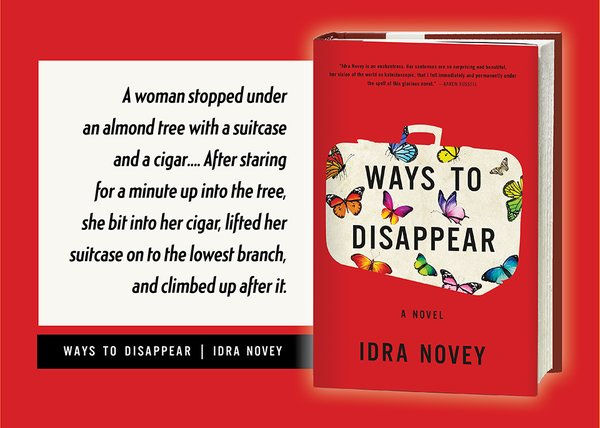A translator living in Pennsylvania is worried: her favorite client is missing. And it’s not just any client but the Brazilian cult novelist Beatriz Yagoda whose work the translator has labored on for years. For peanuts too.
And when I say peanuts I mean that the author and the translator each get about $500 per book! (I have a manuscript of poetry translations that I know I would be lucky to see published expecting not a penny for. )
The translator immediately buys a ticket to Rio. What’s she supposed to do? She knows without a shadow of a doubt that being the author’s translator, it is she who knows the author best and will probably be the perfect person for locating her.
The author’s daughter thinks this is ridiculous. She herself had never read her mother’s books. And who but a daughter knows the mother best?
She had no patience for the illusion that you could know someone because you knew her novels. What about knowing what a writer had never written down—wasn’t that the real knowledge of who she was?
Ways to Disappear is such a fantastic novel. The author Idra Novey is herself an award-winning translator. Most notably of Clarice Lispector, whose life has some resonance with author in Novey’s story. Both being physically beautiful and having been born outside of Brazil. (I didn’t know this about Lispector that she was born in Ukraine but at an early age the family emigrated to Brazil to escape pogroms).
In one of Lispector’s novels, her protagonist says: “I can’t sum myself up because it’s impossible to add up a chair and two apples. I’m a chair and two apples. And I don’t add up,” which is maybe what the daughter of Beatriz Yagoda means when she questions the translator’s feeling that she is the only person who truly understands the author since she is the author’s translator.
How can we ever really know anyone? Or rather, how can we know whether we know? In the case of the story, maybe the translator knew the apples and the author’s daughter knew the chairs about the missing author.
I have alway wanted to write a story about a translator. But translators can feel slippery (Or as Novay says, “available yet silent.”). Last year, I read Katie Kitamura’s novel Intimacies, which has as its protagonist an interpreter at the Hague Court. The book is absolutely brilliant— and the character in Kitamura’s story has many of the same qualities as the translator in Ways to Disappear. Introverted and bookish, Kitamura’s interpreter, like Idray’s translator is a little lost.
This feeling might be part and parcel for many translators who are not bilingual from childhood and whose fluency is not natural or native. In contrast to someone who grew up with two languages, the characters in both stories do not move between linguistic worlds easily. In Kitamura’s novel, the interpreter, who can work in several languages, is groundless and unable to firmly put down roots. She finds commitment hard—not just in relationships but also commitment to place and language. To culture.
The translator in Novey’s book is much the same.
Pittsburgh, Miles, her job—all of it felt like a skin she’d shed on the plane. Even English and who she was in it felt discardable, or at least until the long-haired boys at the prow began strumming the chords to “Redemption Song.”
What I loved best about Novey’s gorgeous book (did I mention she is a poet?) is that the translator in the story is an aspiring writer. This is a transformation that happens as the translator searches for the missing author to whom she has devoted her life. In Brazil, she begins to shake off the translator’s position of being “available yet silent,” where there is “no obvious spot for her to put herself,” to begin writing her own prose in her journal. So, then, this is a search of self-discovery?
The handsome son of the missing author asks her, “Do you write too?” when he spots her open journal on the bed. She says, “Oh, no, that’s nothing.” But later remarks,
traduttore, tradittore—that tired, tortured Italian cliché. If only she’d been born a man in Babylon when translators had been celebrated as the makers of new language. Or during the Renaissance, when translation was briefly seen as a pursuit as visionary as writing. She would have been in her element then. During the Renaissance, no translator had to apologize for following her instincts to champion the work of one of the most extraordinary, under-recognized writers of her time.
Oh how the mighty have fallen?
**
I am trying to find other books with a translator as the main character. Do you have any favorites?
I found this list online—and would love to read the Le Carre novel and Vargos Llosa! I have the Schuler novel but haven’t started it yet.
The Translator – Nina Schuyler. ...
Intimacies – Katie Kitamura. ...
The Interpreter – Suki Kim. ...
Ways to Disappear – Idra Novey. ...
The Summer Before the Dark – Doris Lessing. ...
The Mission Song – John Le Carre. ...
Bel Canto – Ann Patchett. ...
An Unnecessary Woman – Rabih Alameddine.
The The House on Moon Lake—Francesca Duranti
Good on Paper – Rachel Cantor
The Bad Girl – Mario Vargas Llosa






I love this, thank you for the book ideas! Have not read either Idra Novey or Katie Kitamura, I just got both. I’ve struggled with translation—I’m kind of a terrible translator. The only way for me to “understand” Japanese is to not think too hard, and that doesn’t work for translation, since I’m willfully skipping all the words and structures I don’t have an English equivalent for. But I’ve never considered myself bilingual, because my Japanese isn’t fluent. It makes me sad and frustrated to think about how poor my Japanese is, and yet I’m in that weird place where I’m better than most people who try to learn it from scratch. And many people who speak English as a second language are okay with having an accent or not having perfect grammar, but I can’t seem to forgive myself for those crimes in my Japanese.
I recently started a translation project and was frustrated within the first chapter! I thought it would “help” me to dive deep into Japanese on a line-by-line level, looking everything up in a dictionary and hiring a tutor to walk me through grammar I don’t know. I’m still not sure if I’m making my insecurity better or worse! Maybe reading fiction that delves into translators and translation will help clarify things?
Fascinating novel! Thanks for this!